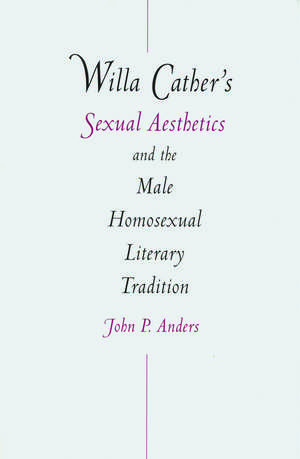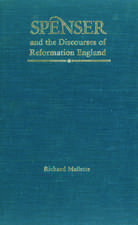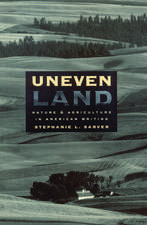Willa Cather's Sexual Aesthetics and the Male Homosexual Literary Tradition
Autor John P. Andersen Limba Engleză Paperback – 31 aug 2001
In this first full-length study of male homosexuality in Cather's short stories and novels, John P. Anders examines patterns of male friendship ranging on a continuum from the social to the sexual. He reveals how Cather's work assumes an unexpected depth and complexity by drawing on both the familiar tradition of friendship literature inspired by classical and Christian texts and a homosexual legacy that is part of, yet distinct from, established literary traditions.
Anders argues that Cather's artistic achievement is distinguished by her sexual aesthetics, an elusive literary style inextricably associated with homosexuality. His analysis demonstrates how a homosexual ethos and eros helped Cather develop a sensitivity to human variation and a style to accommodate it and thus became the objective correlative of her art, dramatizing the diversity of human nature as it deepens the mystery of her work.
| Toate formatele și edițiile | Preț | Express |
|---|---|---|
| Paperback (1) | 143.21 lei 6-8 săpt. | |
| Nebraska Paperback – 31 aug 2001 | 143.21 lei 6-8 săpt. | |
| Hardback (1) | 354.99 lei 6-8 săpt. | |
| Nebraska – 31 oct 1999 | 354.99 lei 6-8 săpt. |
Preț: 143.21 lei
Nou
Puncte Express: 215
Preț estimativ în valută:
27.41€ • 29.79$ • 23.04£
27.41€ • 29.79$ • 23.04£
Carte tipărită la comandă
Livrare economică 21 aprilie-05 mai
Preluare comenzi: 021 569.72.76
Specificații
ISBN-13: 9780803259409
ISBN-10: 0803259409
Pagini: 187
Dimensiuni: 152 x 229 x 15 mm
Greutate: 0.25 kg
Editura: Nebraska Paperback
Colecția University of Nebraska Press
Locul publicării:United States
ISBN-10: 0803259409
Pagini: 187
Dimensiuni: 152 x 229 x 15 mm
Greutate: 0.25 kg
Editura: Nebraska Paperback
Colecția University of Nebraska Press
Locul publicării:United States
Notă biografică
John P. Anders is an independent scholar who lives in Lincoln, Nebraska.
Recenzii
"Willa Cather's fiction cannot be understood separate from her treatment of erotic reality between human beings of the same sex, a fact of which Anders and other recent Cather critics are fully aware. This outstanding contribution to Cather criticism is exceptionally well written, nothing less than a delight to read. Anders's treatment of My Antonia, The Professor's House, and Death Comes for the Archbishop is acutely analytic, skillfully reflecting—and scrupulously crediting—other Cather critics. . . . The study also convincingly presents Cather in her historical context, with the net impact that this short study is in the end greater than most longer studies of Cather's fiction."—Choice









